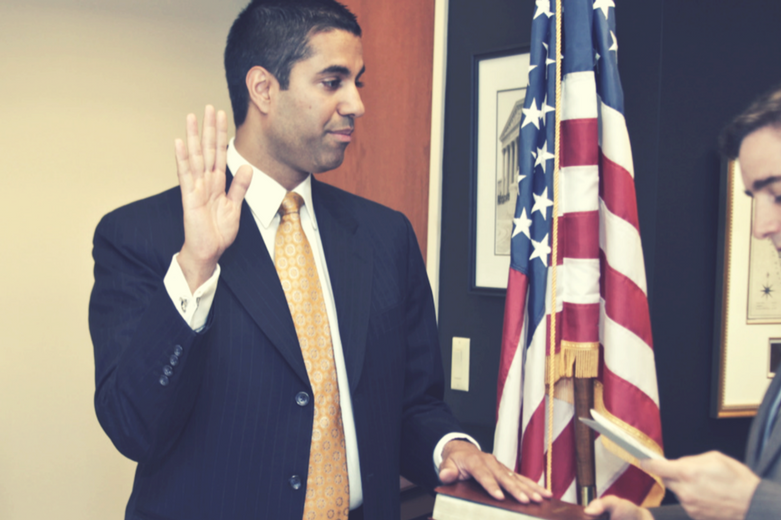
Don't Believe Pai's Lies
Earlier today, Politico reviewed Ajit Pai’s first 100 days as Trump’s FCC chairman. While the piece noted Pai’s disturbing drive to slash crucial internet protections — including Net Neutrality — it also gave credence to his preferred excuse for this deregulatory frenzy. Pai asserts his actions might help close the digital divide, and so Politico reported his claim without questioning it.
As we’ve said again and again, Pai is just plain lying when he suggests that gutting Net Neutrality would do anything to bridge the digital divide. In fact, breaking the open internet would seriously harm people of color and other vulnerable communities.
So what is the reporter referring to here? Pai’s recent adjustment of a Charter merger requirement:
But supporters argue that Pai’s deregulatory bent is all about accomplishing his stated top priority — closing the so-called digital divide between those with internet access and those without. … He ... tweaked a government-imposed condition on Charter Communications’ merger with Time Warner Cable and Bright House Networks, to push the cable giant to expand its network to households that don’t have internet connections.
This framing suggests that by changing Charter’s buildout merger condition, Pai is helping to bring low-income or rural households online.
This framing is wrong.
Here’s the deal: When the FCC approved Charter’s incredibly wasteful and anti-competitive merger a year ago, it extracted several conditions from the broadband conglomerate, including a commitment to build to 1 million unserved locations (also known as new passings) and to 1 million locations that already receive service from another provider (known in the industry as overbuilds).
Merger conditions are notoriously difficult to enforce, as well as grossly inadequate for mitigating the harms of broadband mega-mergers, and Pai’s change made this condition no better. Instead of 1 million new passings and 1 million overbuilds, Charter must now build out its network to 2 million new passings with no overbuild requirements.
Pai would have you believe that this change will somehow result in Charter serving 2 million rural homes that would otherwise have to rely on smoke signals to communicate. But that’s hardly the case.
Charter, like any other incumbent broadband provider, builds “new” lines to new housing developments. Every year, new residential and commercial dwellings are built, and those locations need telecommunications lines, as well as power, water, roads and other infrastructure. For Charter, extending its network to each of these new developments qualifies as a “new passing.”
That means this buildout won’t connect struggling families caught on the wrong side of the digital divide but instead provide service as a matter of course to residents who can afford to move into neighborhoods with new housing growth. What’s more, these 2 million new passings Pai wants credit for were already part of Charter’s business plan.
How do we know this? This isn’t just our analysis. Charter itself has made it clear to investors that the FCC’s buildout requirement would not have any impact on what the company plans in the normal course of business.
Charter CEO Tom Rutledge was asked at an investor conference in March about Pai’s change to the merger buildout requirement. He said:
We’ve said to the FCC we’re going to build two more million passings over the next four or five years, I can’t remember the exact commitment, I think it’s five years. So that’s 400,000 passings a year. And that’s really about what the growth rate of passings is.
In other words, Charter is basically just building to new homes. It’s not building out to existing homes that are unconnected today. Neither Charter’s buildout commitment, nor Pai’s changes to it, will help connect rural households that currently lack internet access. The changes won’t close the digital divide in any manner. The only material difference Pai’s adjustment will make is to eliminate competition for 1 million locations by removing the condition for Charter to overbuild.
The media need to do a better job of holding powerful individuals like Chairman Pai accountable for their claims. This information on Charter’s actual buildout plans isn’t secret — all of it is readily available to any reporter seeking to double-check Pai’s talking points. Still, many outlets are willing to accept official arguments at face value and report them uncritically to the public.
But the public is more engaged than ever. Millions are standing up for Net Neutrality and demanding affordable internet access for their communities. At a time when movements are organizing and mobilizing people for political resistance, our communities need the best possible information, and they need it from a watchdog press.
Pai has betrayed his stated commitment to bridging the digital divide over and over again. It’s time for the press to call his posturing on Charter’s buildout claim what it is: nothing but empty rhetoric.